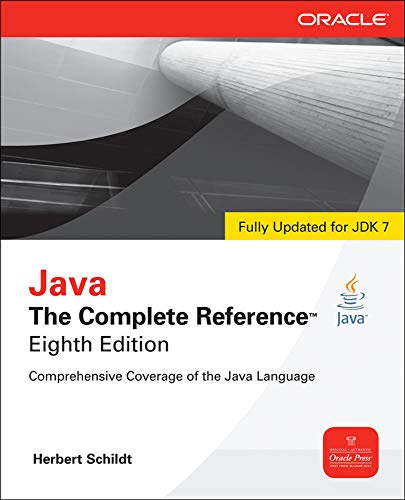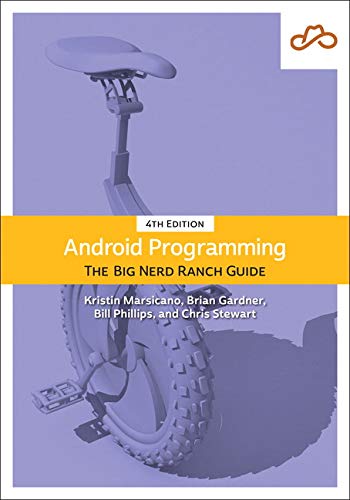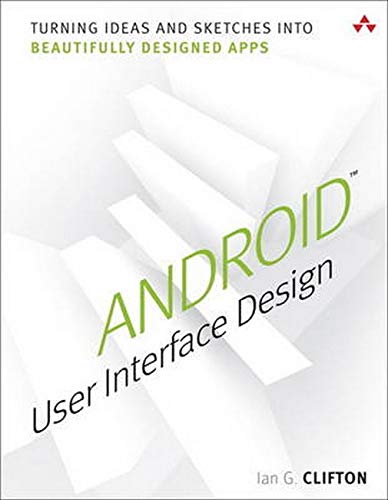(Part 3) Top products from r/androiddev
We found 22 product mentions on r/androiddev. We ranked the 138 resulting products by number of redditors who mentioned them. Here are the products ranked 41-60. You can also go back to the previous section.
41. The Complete Software Developer's Career Guide: How to Learn Programming Languages Quickly, Ace Your Programming Interview, and Land Your Software Developer Dream Job
Sentiment score: 1
Number of reviews: 1
 Show Reddit reviews
Show Reddit reviews42. Embedded Programming with Android: Bringing Up an Android System from Scratch (Android Deep Dive)
Sentiment score: 2
Number of reviews: 1
 Show Reddit reviews
Show Reddit reviews43. More Fearless Change: Strategies for Making Your Ideas Happen
Sentiment score: 1
Number of reviews: 1
 Show Reddit reviews
Show Reddit reviews44. Android Hacker's Handbook
Sentiment score: 2
Number of reviews: 1
John Wiley Sons
 Show Reddit reviews
Show Reddit reviews45. The Non-Designer's Design Book (4th Edition)
Sentiment score: 0
Number of reviews: 1
Peachpit Press
 Show Reddit reviews
Show Reddit reviews46. Java The Complete Reference, 8th Edition
Sentiment score: 0
Number of reviews: 1
 Show Reddit reviews
Show Reddit reviews47. Android Database Best Practices (Android Deep Dive)
Sentiment score: 1
Number of reviews: 1
 Show Reddit reviews
Show Reddit reviews48. BESTEK Magnetic Cell Phone Desk Holder Desktop Mount, Fits All Smartphone and Small Tablets, Black
Sentiment score: 1
Number of reviews: 1
Hands Free: Free your hands to use your mobile devices everywhere you like: office, kitchen, gym,etc. Full 360 degree rotation.Universal: Compatible with any smart phones, small tablets and other mobile devices which are less than 17.6 ounces (1.1 pounds).Super magnetic: The stand comes with metal p...
 Show Reddit reviews
Show Reddit reviews49. Android Programming: The Big Nerd Ranch Guide (4th Edition) (Big Nerd Ranch Guides)
Sentiment score: 0
Number of reviews: 1
 Show Reddit reviews
Show Reddit reviews50. Professional Android 2 Application Development
Sentiment score: 1
Number of reviews: 1
 Show Reddit reviews
Show Reddit reviews52. The No Asshole Rule: Building a Civilized Workplace and Surviving One That Isn't
Sentiment score: 1
Number of reviews: 1
Business Plus
 Show Reddit reviews
Show Reddit reviews53. Sony A7 / A7R: From Snapshots to Great Shots
Sentiment score: 1
Number of reviews: 1
 Show Reddit reviews
Show Reddit reviews54. Agile Software Development, Principles, Patterns, and Practices
Sentiment score: 0
Number of reviews: 1
 Show Reddit reviews
Show Reddit reviews55. Android User Interface Design: Turning Ideas and Sketches into Beautifully Designed Apps (Usability)
Sentiment score: 1
Number of reviews: 1
 Show Reddit reviews
Show Reddit reviews56. Software Architecture in Practice (3rd Edition) (SEI Series in Software Engineering)
Sentiment score: 1
Number of reviews: 1
Addison-Wesley Professional
 Show Reddit reviews
Show Reddit reviews57. The Pragmatic Programmer: From Journeyman to Master
Sentiment score: 1
Number of reviews: 1
Save up to 15% when buying these two titles together.The Pragmatic Programmer cuts through the increasing specialization and technicalities of modern software development to examine the core process--taking a requirement and producing working, maintainable code that delights its users.It covers topi...
 Show Reddit reviews
Show Reddit reviews



Every project is made up of different people and they all have their own vibe. For the last 10 years, at least part of my job has been working in and managing people who work on open source. I and my team have contributed to AOSP, Eclipse, Apache, and others.
A random collection of unordered thoughts...
Hey that is the million dollar question. But because software is not an engineering, actually there is no reference book on SW architecture. Certainly there are books talking about this, but usually covering only some aspects and without real application examples.
Notice that in iOS programming the system imposes a great part of the architecture, so these guys are usually less concerned. But in Android we have more freedom, and the API actually encourages really bad practices (thanks Google). Because of this we are all a bit lost. Nowadays layered architecture and MVP seems to be the most popular approach, but then again everybody produces a different implementation...
Specifically for Clean Architecture you should read its author, Robert C. Martin. AFAIK this is not covered in detail in his books. You can read this blog post and watch this video. Other designs usually coming up in conferences are the Onion Architecture and the Hexagonal Architecture. But make no mistake: there's no route map on how to implement any of those, and examples claiming to follow this or that approach are usually not written by the authors of the architecture.
For DDD there is a very good book by Scott Millet with actual examples. But this style is meant for large enterprise backend apps, and the author himself advices against using is in small apps. So I'd say it is overkill for Android, but of course you could reuse some concepts successfully.
Theres also Software Architecture in Practice 3rd, but having read the 2nd edition I can tell you this is just smoke.
Probably best book to date is Fowler's but this is more a patterns compilation than an architecture guide.
That is a very broad question. To be a good programmer you have to practice (program) a lot and not just the same thing, but various kind of projects and challenges, there are just too many areas to list here and the challenges vary by programming language, operating system to the actual problem domain.
Choose a language or 2 from different paradigms (functional, OOP, structured) and try to solve the same problem in each of them.
You'll also want to spend time doing some reading, some well known books for example:
For just the programming aspect you can start trying to solve leet code style questions such as the ones found in Coder Wars or Leet Code
The following book does a much better job at providing an overview of what you can do as a programmer and the available career paths:
> And second question backend or mobile development(native) in future?
For this I think you can be a successful professional in either, there are times when you can get away with not needing a "backend" with custom logic and you can just use a data store, but if you ever need to do some centralized processing or computation that requires more resources (memory, CPU) than a typical device can offer there's no escaping the need for backend development. The challenges in the backend are very different to the ones on the frontend (be it native or web based) and the approach is more focused on system design with a bit more traditional Computer Science topics.
You can definitely make good looking apps on your own! Keep in mind, though, that interfaces are about aesthetics AND usability. You don't need any artistic gifts or graphic design skills to create an efficient and usable interface.
I know you're looking for something Android-specific, but I'd recommend starting with The Design of Everyday Things to get a high-level idea of how you should approach design. You might also want to consider watching Sketching and Experience Design, which is a 2007 talk given by Bill Buxton that covers the process of design. He also has an excellent book on sketching UI.
Although old, this book does a very good job explaining the Android architecture https://www.amazon.com/Embedded-Android-Porting-Extending-Customizing/dp/1449308295
Given it was written for Android 4, it doesn't have all the new Treble staff (the basis are still the same, so I think it's still worth reading), but the author has a set of slides that you can read after the book to get the recent changes: https://www.slideshare.net/opersys/presentations
​
Another useful book is https://www.amazon.com/Embedded-Programming-Android-Bringing-Scratch/dp/0134030001 . This one focuses more on getting AOSP running on a new device, and not that much in its internals or customization.
​
Two newer books I have recently found (although I haven't had time to read them) are https://www.amazon.com/Android-System-Programming-customizing-debugging/dp/178712536X (same author as the previous one, content mostly related to building the kernel and getting AOSP running in a new device/emulator) and https://www.amazon.com/Learning-Embedded-Android-N-Programming-ebook/dp/B01841W9AU
They are still pre-treble, but they are probably still useful.
​
Besides those, if you want something more related to internals and not so much on how to "get the source code and build AOSP", you could check https://www.amazon.com/Android-Security-Internals-Depth-Architecture/dp/1593275811 and https://www.amazon.com/Android-Hackers-Handbook-Joshua-Drake/dp/111860864X
Yeah. Designers can be responsible for a lot. Anyways, I started designing for Android before I knew any development. It was hard to learn, because all of the concepts are brand new. So I don't think he will be able to learn well without seeing the results of his work.
Anyways, this book does a great job of tackling native and 9-patch solutions for GUI design. It also explains selectors, which is crucial for a designer to understand. Much more in the book than I'm giving credit for, but it's definitely enough to get started.
http://www.amazon.ca/gp/aw/d/0321886739/ref=mp_s_a_1_fkmr1_2?qid=1394554598&sr=8-2-fkmr1&pi=AC_SX110_SY165_QL70
Its pretty common to struggle introducing new techniques or technologies in an organization. A good book I enjoyed on the topic was "More Fearless Change" by Linda Rising
https://www.amazon.com/More-Fearless-Change-Strategies-Making/dp/0133966445
Don't give up just yet, keep looking.
Do you have a portfolio? if not try to work on a project of your own so you can have something to show.
And if you are considering improving your java skills try work with libraries like:
With spare time I would also recommend you to read:
Depending on how skilled you are at Java:
Then for Android specifically:
Yes, I actually ended up figuring this out yesterday. Here's how I ended up doing it:
protected Void doInBackground(Void... params) {
//String url = "http://www.amazon.com/gp/product/B00FRDUZXM/ref=s9_simh_gw_p14_d0_i2?pf_rd_m=ATVPDKIKX0DER&pf_rd_s=desktop-4&pf_rd_r=0ZV79CBKAVKNW0RD843D&pf_rd_t=36701&pf_rd_p=1970566762&pf_rd_i=desktop";
String url = "http://www.amazon.com/VeggieTales-Very-Merry-Larry-Christmas/dp/B00H2T37SO/ref=pd_rhf_gw_p_img_3";
//String url = "http://www.amazon.com/Sony-A7-A7R-Snapshots-Great/dp/0321968603/ref=pd_rhf_gw_p_img_4";
try {
// Connect to the web site
Document document = Jsoup.connect(url)
.userAgent("Mozilla/5.0 (Windows NT 6.1; WOW64; rv:8.0.1) Gecko/20100101 Firefox/8.0.1")
.get();
// Get the html document title
Elements trs = document.select("span#priceblock_ourprice");
Element price1 = trs.first();
if(price1 != null)
{
String str1 = price1.text();
System.out.println(str1);
String str2 = str1.replaceAll("[$,]", "");
double aInt = Double.parseDouble(str2);
System.out.println("Price: " + aInt);
}
else
{
Elements price2 = document.select("table.product b.priceLarge");
String priceWithCurrency = price2.text();
System.out.println(priceWithCurrency);
System.out.println(priceWithCurrency);
String priceAsText = priceWithCurrency.replaceAll( "[$,]", "" );
double priceAsNumber = Double.parseDouble(priceAsText);
System.out.println("Price: " + priceAsNumber);
}
} catch (IOException e) {
e.printStackTrace();
}
return null;
}
I have a magnet plate on my phone that was originally just for use in the car. But then I bought a couple of these for home/work and it works pretty well while doing tests/debugging. But I also mostly use wifi debugging. At least for the Pixel you only have to plug in the usb to turn on wifi debugging after a reboot.
If your brother already knows how to program then I would recommend Professional Android 2 Application Development. I like it because it is concise and lets you look up how to do something quickly.
any thoughts(you or anyone reading this) on the book you linked vs this one? besides the stark difference in reviews lol
I think Uncle Bob's PPP Book is the original book from 2002. May be more options by now though.
Yeah, me too.
Check out The Non-Designer's Design Book by
Robin Williams.i would go with opengl es 2.0 rather than OpenGL ES 1.1 and for OpenGL ES 2.0 only this book available and it was really helpfull for me so i highly recommend it.
Most of the comments here make me realize I should pull the CLR book down off the shelf and do some homework again.
Grady Booch
http://www.amazon.com/gp/aw/d/020189551X/ref=pd_aw_sbs_14_2?ie=UTF8&dpID=51-uo4HUPCL&dpSrc=sims&preST=_AC_UL100_SR100%2C100_&refRID=110KGH6M22KWAJHKWZ5F
Eric Evans
http://www.amazon.com/Domain-Driven-Design-Tackling--Software/dp/0321125215
Martin Fowler
http://www.amazon.com/Patterns-Enterprise-Application-Architecture-Martin/dp/0321127420